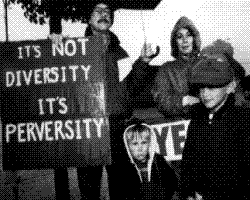On every side, one can read obituaries for the religious right.
Jim Wallis’s new book, The Great Awakening, carries the subtitle, Reviving Faith and Politics in a Post-Religious Right America. E. J. Dionne Jr.’s book, Souled Out, is subtitled Reclaiming Faith and Politics After the Religious Right. The subtitle of David P. Gushee’s new book, The Future of Faith in American Politics, poses The Public Witness of the Evangelical Center against that of the religious right.
Sometimes stated outright and sometimes between the lines is the hope that the decline of the religious right will ease what Americans have come to know as the culture wars.
There is no question that many evangelical Christians and conservative Roman Catholics have grown disenchanted with both the political agenda and what they see as the strident style of the organized religious right. Some have been convinced, by their own Scriptures and by new leaders, that poverty, human rights, genocide, sex trafficking, and global warming must be no less matters of Christian concern than abortion, homosexuality, and embryonic stem-cell research. Even more have reacted against their faith being enlisted in partisan politics.
But what will this retreat of the religious right mean for the future of the culture wars? Caution is in order. Combat may wane, at least a little, at least for a while. But there are good reasons to doubt any lasting truce, let alone a real peace.




